Conclusion: Utopias
by“Conclusion: Utopias”, As we look toward the future of undocumented queer youth, their journey is one marked by adversity and resilience in a world that often seeks to erase their identities. These youth frequently face rejection from their families, compounded by a culture that erases queer existence in favor of heteronormative ideals. In the face of such challenges, they turn to icons of queer culture—figures like Walter Mercado and Chavela Vargas—who offer not just representation, but a sense of belonging and empowerment. These cultural symbols help them articulate their identities with pride and courage. The anthem “La vida es un carnaval” by Celia Cruz becomes a powerful reminder to embrace life fully, despite the injustices that threaten to diminish their worth. It reflects the collective spirit of resilience, especially when tragedies like the Orlando nightclub shooting remind us of the vulnerability queer communities face. This song symbolizes not just survival, but the celebration of life in defiance of the forces that seek to oppress.
The author integrates the thoughts of José Esteban Muñoz, whose work suggests that queerness represents a utopian ideal, one that surpasses the struggles of today’s reality. According to Muñoz, queerness embodies a vision for the future where queer identities are fully embraced, not sidelined or erased. Realizing this ideal will require a radical transformation of our social structures, which today continue to marginalize many groups. This transformation, the text suggests, begins with activism, imagination, and a commitment to dismantling the physical and metaphorical walls that divide us. The author points out the stark inequalities of the present, including systemic violence, homelessness, and other societal issues that disproportionately affect marginalized communities. These social ills are exacerbated by a built environment—walls, fences, and boundaries—that aim to isolate and fragment the very fabric of society. As these divides grow, so does the need for a collective, imaginative approach to rethinking our future. The walls that divide us—whether physical, social, or economic—must be torn down if true justice is to be achieved.
In examining these themes, the text emphasizes the role of collective action and imagination in shaping a better world. Drawing on the legacies of past social movements, the author highlights the power of art, rebellion, and public demonstrations to enact change. These movements are not just about resistance to oppressive systems, but about creating something new—a world where all people can live authentically. The author illustrates this through personal stories of resilience, showing how queer individuals navigate everyday challenges to assert their identities. One such story is that of Itzcali, who overcomes familial pressure and financial hardship to pursue education and create a meaningful future. This story is emblematic of the power of perseverance and the importance of community support. Itzcali’s journey illustrates that, even in the face of adversity, it is possible to flourish through education, self-empowerment, and the help of a supportive community. The text suggests that these stories of resilience are not isolated but form part of a broader movement toward a more inclusive and just society.
The narrative also calls attention to the need for continued resistance in the face of systemic oppression. It encourages readers to draw on the experiences of past radicals who fought for social justice through activism and artistic expression. By engaging in these practices, individuals can resist the forces that seek to marginalize them and instead help create a society that values all its members. This call to action is both personal and collective, urging readers to reflect on their role in shaping a world that values justice, equality, and inclusion. The text underscores that activism and imagination are not just tools for resistance, but for transformation. Through solidarity and shared efforts, new social frameworks can emerge—ones that embrace diversity, equality, and justice. By focusing on the collective struggle, the text offers a hopeful vision of the future, one in which communities no longer have to fight merely to survive, but can flourish in a world that recognizes and celebrates their identities. In this way, the text offers a path forward, urging readers to take an active role in dismantling oppressive systems while fostering a world where all can thrive.

